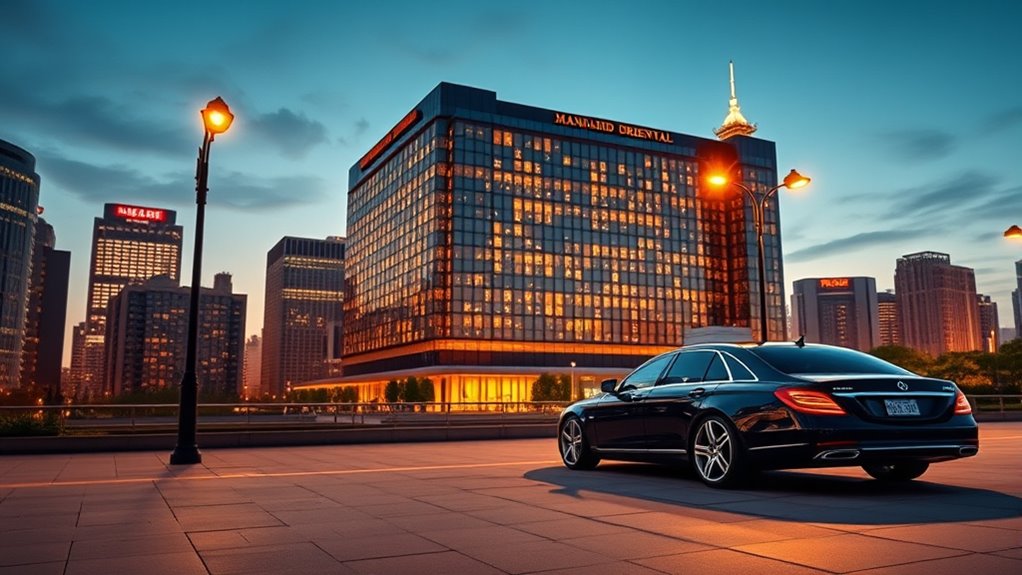Mandarin Oriental is officially going private through a $4.2 billion deal, approved by its controlling shareholder Jardine Matheson. You’ll see shareholders receiving $3.35 per share, including a special dividend funded by property sales in Hong Kong. The privatization aims to boost strategic growth, asset efficiency, and operational flexibility, especially in key markets like North America. To learn more about this transformative move and what’s next, keep exploring the details behind this significant transaction.
Key Takeaways
- Mandarin Oriental is going private through a $4.2 billion deal led by Jardine Matheson.
- The transaction includes a $0.60 special dividend funded by Hong Kong property sales.
- The deal offers a 52.3% premium over recent share prices and requires 75% shareholder approval.
- Sale of key Hong Kong assets, valued at $925 million, supports the privatization and strategic goals.
- The privatization is expected to close by February 2026, enabling long-term growth outside public markets.

Mandarin Oriental Hotel Group is set to go private in a deal valued at $4.2 billion, marking a significant shift for the luxury hotel operator. This move comes as Jardine Matheson, the company’s controlling shareholder, plans to acquire the remaining 11.96% stake through its subsidiary Bidco. The transaction’s total enterprise value reflects a considerable premium, with an offer of $3.35 per share, comprised of $2.75 in cash and a $0.60 special dividend funded by proceeds from the sale of the One Causeway Bay property. This offer represents approximately a 52.3% premium over the closing share price of $2.20 on September 29, 2025. Following the announcement, the share price surged by up to 36.7%, signaling strong investor confidence in the deal’s value proposition. The deal is subject to approval by at least 75% of Mandarin Oriental shareholders, which is a standard requirement for such privatizations. The financial details underscore the strategic nature of this privatization. The $0.60 special dividend is paid out of proceeds from the sale of the iconic Hong Kong property, which is scheduled to complete by December 31, 2025. The transaction is expected to close by February 28, 2026, pending relevant regulatory approvals. The $3.35 bid is particularly aggressive, with premiums ranging from 62.6% to 70.9% over recent volume-weighted average prices, indicating Jardine Matheson’s confidence in the long-term value of Mandarin Oriental. The acquisition will be financed through a combination of cash reserves and committed credit facilities, ensuring a smooth execution. Concurrently, the sale of the One Causeway Bay property plays an essential role in funding the privatization. The asset includes the top floors of the hotel building in Hong Kong, along with rooftop signage and parking spaces, valued at approximately $925 million. Alibaba Group and Ant Group are the buyers, with plans to use the space as Alibaba’s Hong Kong headquarters. This strategic sale not only provides the necessary funds for the dividend but also aligns with the company’s broader strategy of asset optimization. The move to privatize allows Mandarin Oriental to streamline its operations and focus on long-term growth outside the pressures of the public markets. With a portfolio of 43 hotels, 12 residences, and 26 luxury homes across nearly 27 countries, the company aims to leverage the flexibility of private ownership to redevelop properties, expand in key markets like North America, and execute strategic repositioning. Self watering plant pots can also be beneficial for maintaining plant health during this transition. The privatization is overseen by the Mandarin Oriental Transaction Committee, which is tasked with managing potential conflicts of interest given the intertwined directorships with Jardine Matheson. This coordinated approach signals a strategic effort to optimize the company’s future trajectory under a more agile and focused governance structure.
Frequently Asked Questions
What Are the Future Plans for Mandarin Oriental Post-Privatization?
Your future plans for Mandarin Oriental focus on rapid expansion and strengthening its luxury brand. You aim to double the hotel portfolio over ten years, emphasizing key regions like the Middle East, Japan, North America, and Europe. You plan to grow through management contracts, develop flagship and boutique hotels, and incorporate private residences. This strategy balances heritage properties with innovative offerings, ensuring high standards and attracting affluent travelers worldwide.
How Will the Privatization Impact Current Employees and Management?
You’ll likely see significant changes in your workplace, similar to what happened at another luxury hotel chain after privatization. Management shifts may lead to new leadership roles and strategic focus, affecting your daily routines. For example, some staff might face layoffs, while others will be encouraged to align with the new vision. Overall, the privatization aims to streamline operations, but it could bring uncertainty and new opportunities for growth.
What Are the Risks Associated With the $4.2 Billion Deal?
You face several risks with this $4.2 billion deal. The high premium could limit future returns if market conditions shift. Deal dependencies on asset sales and regulatory approval add uncertainty. Conflicts of interest among directors might challenge transparency. Market volatility and competitive pressures could impact profitability post-privatization. Plus, legal challenges from dissenting shareholders and concentration of liabilities increase your financial and operational risks, making the deal complex and potentially risky.
Will There Be Any Changes to the Hotel Brands and Services?
Will your experience at Mandarin Oriental change? Not really. The brand’s core identity, service quality, and luxury standards will stay the same, ensuring you receive the high-level experience you expect. As the company goes private, it can focus more on maintaining excellence and expanding strategically. So, you can continue enjoying the same exceptional services, knowing that the core of what makes Mandarin Oriental special remains unchanged.
How Does This Privatization Affect Shareholders’ Long-Term Interests?
This privatization benefits your long-term interests by providing a substantial premium on your shares, giving you an immediate exit value. It removes market risks associated with public trading and allows the company to focus on strategic growth without public market pressures. You can expect faster decision-making and potential investments in new projects, which could boost future value. Overall, going private aims to enhance Mandarin Oriental’s stability and growth, aligning with your long-term investment goals.
Conclusion
This $4.2 billion deal symbolizes more than just a transaction; it marks a new chapter where tradition and innovation intertwine. Like a timeless lantern, Mandarin Oriental’s privatization illuminates the path forward, guiding the brand through uncharted waters. As you watch this transformation unfold, remember that every ending holds the promise of new beginnings. The future is a blank canvas, waiting for your touch to turn aspirations into reality.










